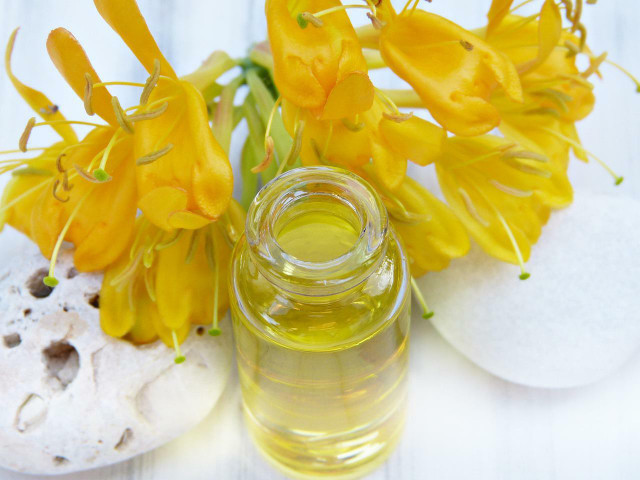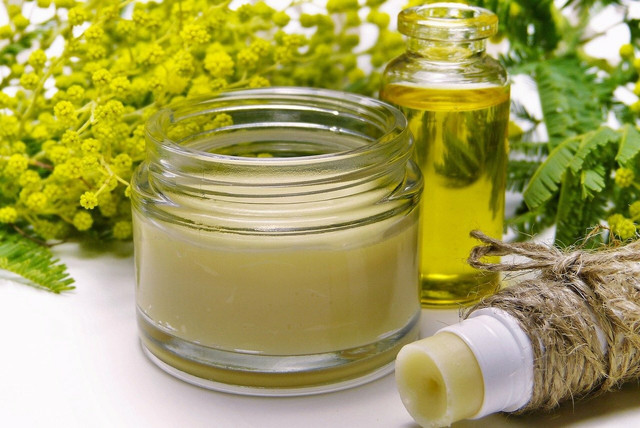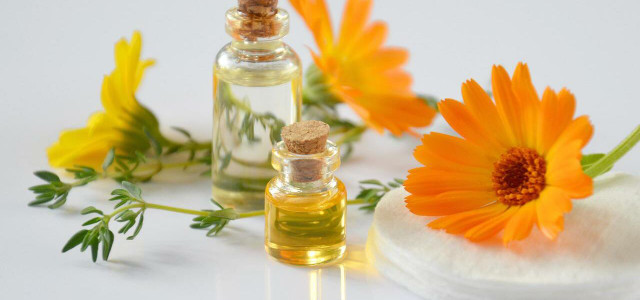Patchouli oil has a very distinct scent, and is commonly used topically and for aromatherapy. Patchouli benefits range from household to wellness, learn more here.
Patchouli oil is derived from the leaves of the patchouli plant, which is native to tropical Asian countries. The leaves and stems are dried out and distilled, and the essential oil is then extracted. Known for its woody, earthy, sweet and spicy scent, this essential oil has been used for centuries for its many benefits ranging from household to medicinal. It is now commonly added in commercial products including colognes, makeup, and incense.
Benefits of Patchouli Oil

(Foto: CC0 / Pixabay / silviarita)
As with all essential oils, patchouli benefits are diverse. You can use the essential oil for:
- Skin care: patchouli oil has been shown to have several benefits for the skin. Firstly, patchouli oil can be anti-aging as it has the potential to prevent wrinkles, increase skin elasticity and increase collagen content by over twenty percent. Patchouli oil also stimulates the growth of new skin cells, helping to maintain a youthful look. It can also benefit dermatitis, acne, eczema, and dry skin.
- Wound healing: because patchouli oil speeds up cell rejuvenation, it promotes faster healing and prevents scar formation. It is also antiseptic, which makes it great for small cuts and bites.
- Pain relief: patchouli oil can be used as a pain relief agent, due to its anti-inflammatory properties.
- Mental health: the strong scent of patchouli oil allows it to be used in aromatherapy. This essential oil is commonly used to relieve anxiety and depression. It’s even been shown to decrease stress in short-term situations through inhalation.
- Dandruff: patchouli oil is commonly used to treat dandruff as well as overly greasy hair.
- Antibacterial and anti-fungal: patchouli oil has antibacterial properties as well as anti-fungal properties.
- Insecticide: patchouli oil makes a great natural insecticide which is effective in killing off pests without hurting the environment.
Using Patchouli Oil



(Foto: CC0 / Pixabay / silviarita)
When using patchouli oil, you must first dilute it with a carrier oil. Common carrier oils include grapeseed oil or avocado oil. For each ounce of carrier oil, you can add anywhere between 15 to 60 drops of patchouli oil, resulting of a dilution rate ranging from 2.5% to 10%.
Once you’ve mixed the oils to your preferred dilution rate, do a patch test on your skin before using the solution. You can do this by putting a couple drops onto your arm, covering it with a bandage, and checking for signs of irritation over the next 48 hours. If there are no issues, use your patchouli oil solution as you please.
For aromatherapy, you can use diluted patchouli oil with a diffuser or steam inhaler. You’ll also benefit from the aromatherapy simply by using the oil on your skin and massaging it into your body. However, if you want to properly diffuse the oil to soak up the aromatherapy benefits, use a diffuser – just be sure to do this in a well-ventilated area with many open windows. Don’t partake in aromatherapy for longer than thirty minutes as a time, or you may get lightheaded, dizzy, and/or nauseated. Make sure not to expose pets or children to the diffused patchouli oil as well.
Drawbacks of Patchouli Oil



(Foto: CC0 / Pixabay / kerdkanno)
It is important to note that patchouli oil is not safe for everyone. The essential oil can affect blood clotting, which means individuals with bleeding disorders, or those taking blood-thinking medications, should not use patchouli. You also shouldn’t use it if you recently had or soon will be undergoing a major surgery.
When using patchouli oil on your skin, make sure to do a spot test, as some people are allergic. Furthermore, regardless of whether you’re using the oil topically or in aromatherapy, make sure to dilute it with a carrier oil as essential oils are highly concentrated. We also recommend purchasing certified organic, and fair trade patchouli oil – if possible, try to find some from a local source.
Read more:
- Black Seed Oil Benefits: A Natural Panacea
- 6 Real Benefits of Jasmine Essential Oil
- Babassu Oil: Properties, Uses, and Sustainability
Important Information regarding Health-related Topics.
** Links to retailers marked with ** or underlined orange are partially partner links: If you buy here, you actively support Utopia.org, because we will receive a small part of the sales proceeds. More info.Do you like this post?







